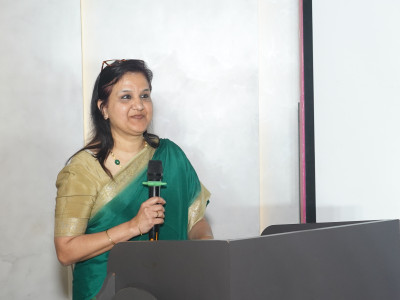Women need to put themselves out there a lot more: Prachi Bali
We, at Adgully, have always saluted and honoured women managers and leaders across diverse fields. Last year, we launched our unique and distinct program, called WOMEN DISRUPTORS, which drew a lot of attention and was highly appreciated by the industry. W-Suite is a special initiative from Adgully that has been turning the spotlight on some of the most remarkable women achievers in M&E, Advertising & Marketing, PR & Communication industry. In the refurbished series, we will find out how women leaders have been managing their teams and work as well as how they have been navigating through the toughest and most challenging times brought about by the global pandemic.
In conversation with Adgully, Prachi Bali, National Head Client Partnerships and Business Head - North, FoxyMoron, sheds light on the women leaders of today, why women need to find strong mentors for themselves, how gender pay gap remains a serious challenge, and much more.
How would you define today’s women leaders?
Some of the key attributes that leaders today (who also happen to be women) embody is resilience, excellence in multitasking and possessing a thirst for knowledge. I personally believe that leadership capabilities are gender agnostic.
What are the foremost attributes that women leaders in today’s business ecosystem must possess?
The ability to voice your opinions out loud. Do not let your age, gender, designation, role in the organisation act as deterrents. Second, it is crucial to not get swayed by impassioned predispositions and learn to look at them objectively and say no when necessary.
Despite the qualifications, aptitude and experience, why do you think we don’t see the expected number of women business leaders, especially when it comes to boardroom decision-making?
I think women need to put themselves out there a lot more. Also, there is a lack of infrastructure to support women, especially once they become mothers. This needs to come from either their families or organisations. While we are making progress and moving towards a more gender fluid society, it is a change that will take some time to manifest.
What do Indian corporates need to do to encourage and groom women leaders?
Women need to find strong mentors for themselves, and organisations need to invest in training plus encourage these conversations. These trainings can range from teaching women to be more assertive, learning the tools to have difficult conversations or even handling negotiations. Once the core foundation is established, we will see more women leaders in senior positions.
According to you, what are the Do’s and Don’ts for women to break through the glass ceiling?
There are a couple of things that come to mind (and not only for women, but for thought leaders across the board), but the most significant ones are as follows:
Time Management: Learning what is a priority is one of the most important skills one can teach themselves
Learning to say ‘NO’: We don’t say ‘No’ enough. We have to learn to voice our opinion in a manner that is synonymous with the values that we epitomise
Work hard & train yourself: If you want to be recognised for your work, hard work is the only way. Constantly strive to become a better version of yourself
Don’t be in an organisation that does not respect equality: In the long run you’ll be happier having given up on a few smaller things, but not critical ones like this
Don’t be in an organisation that does not complement your values: Respect needs to be at the heart of every organisation. Learn to recognise toxic traits and have the courage to walk away.
How acute is the gender pay gap issue in India? What needs to be done to address this in an effective manner?
In 2020, India ranked 112 on the gender pay index and it remains a serious challenge in both the organised and unorganised sectors. For me personally, the Co-Founders of Zoo Media never remunerated or promoted based on gender, it was always based on merit. Touching upon what I said earlier, choosing organisations with shared values eliminates such things. Second, I believe it is imperative to firmly ask for what you deserve to be paid, if you have results to show for it.
What are the five most effective lessons that you have learnt as a woman leader?
Learn the process: When you are working in a particular vertical, it is imperative that you acquaint yourself with the processes and procedures involved to do all the tasks (right from the most crucial one to the most menial one). There is no substitute for hard work and it will get rewarded, eventually.
Empathy will differentiate you from the rest: Sympathising with people is great, but it is important to step into their shoes and understand their side of the story, especially before a business driven conversation.
Don’t be afraid of conflict: Avoiding a conflict will only result in more problems adding to inadvertently creating a hostile environment. My personal experience states that the sooner you talk to people and get things sorted, the better. It builds healthy relationships and drives productivity.
Your team will determine your efficiency: You are only as good as the weakest member in your team. Work on building strong teams. Skills can be taught, but integrity has to be an internal function.
Be loyal, especially to yourself: It is important to build as you grow. Have the courage to build for something larger than yourself. At the same time take pride in your growth and achievement.
How challenging has it been for you to maintain a balance between career goals and family responsibilities? What is your mantra to maintain that balance?
My biggest and only mantra is to learn when to “switch off”. I choose to keep my email notifications off on my phone because at one point I was constantly answering emails no matter if it was 2 am or a Sunday. I also make it a point to take one holiday a year, where I completely log off from work for a week to ten days (barring 2020, of course). Doing these little things gives me the opportunity to completely recharge and be present with my family and friends. Yes, your career and work is important, but so is the need to disengage yourself and do things aside from your job that make you happy. It will only result in better productivity!
How prevalent are the instances of Sexual Harassment in workplaces in India? What should the industry collectively do to tackle such a serious issue?
Instances of sexual harassment in India at workplaces are disturbingly common, but not reported as often. In order to break through, one needs to have frequent training sessions and not just the once during onboarding. Team leaders (and not just the HR) need to proactively connect with their employees to ensure everyone feels safe and protected. Aside from this, we need stricter implementation of government introduced policies and an approachable environment in the workplace, wherein no one, barring age, gender, designation, feels any hesitation in reporting an untoward incident.




















Share
Facebook
YouTube
Tweet
Twitter
LinkedIn